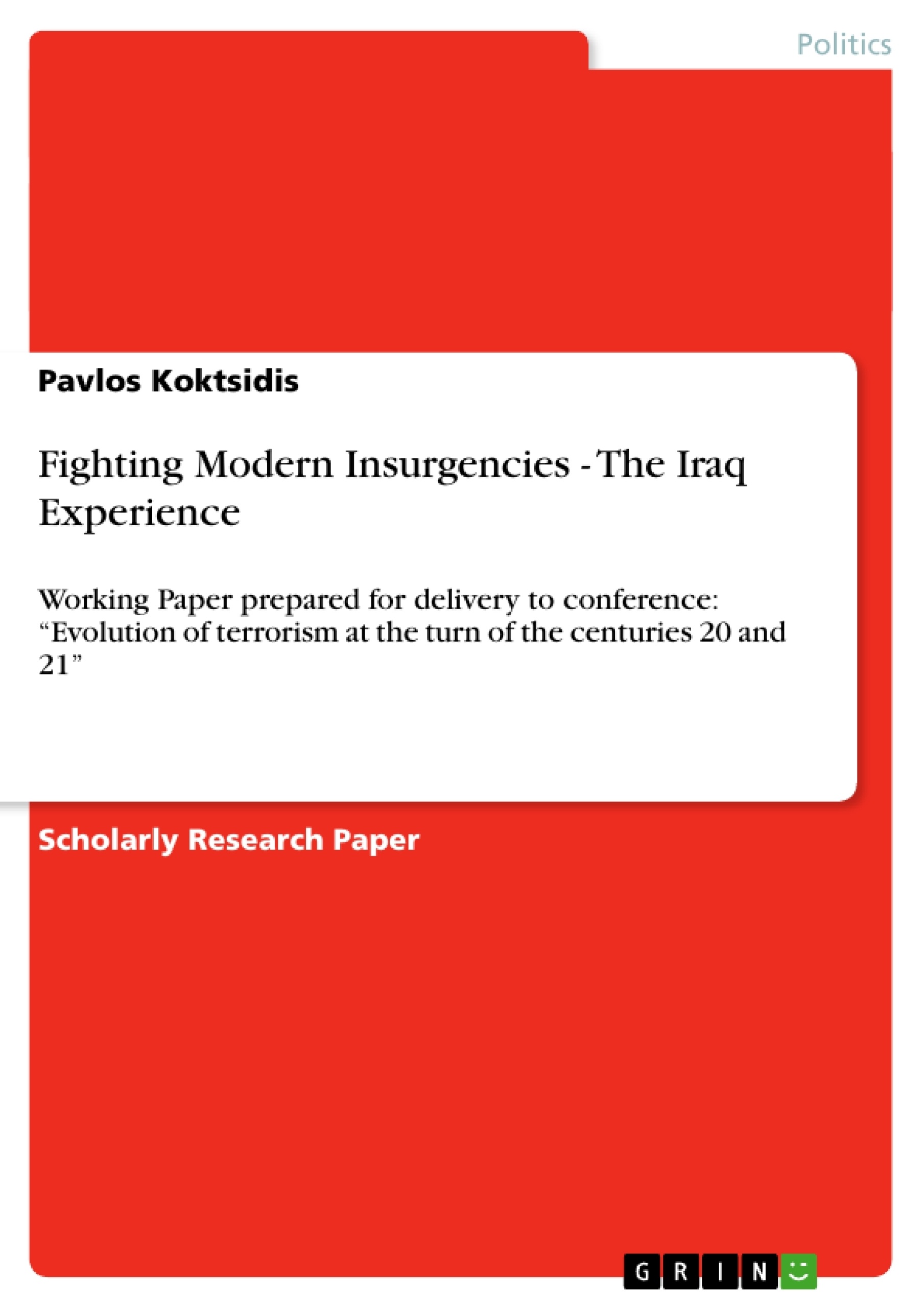Excerpt
ABSTRACT
This paper analyzes modern insurgency and emphasizes some of the difficulties and dilemmas in contemporary counter-insurgency policymaking in Iraq. The analysis starts with the definition (s) and structural components of an insurgency. Differences between ‘classic’ and ‘modern’ insurgencies are underlined with the aim of presenting the evolution and adjustability of insurgent warfare. Modern insurgency is becoming increasingly networked, transnational, tactical and diverse in its methods. Conventional means are increasingly used against soft targets causing maximum loss and damage. A metastasis of warfare from the rural terrain to the urban domain has complicated efforts for countering violence. The paper argues that the question over ‘doctrine versus flexibility’ in counter-insurgency policymaking should be thoroughly re-examined. Given that insurgencies are social events, deeply rooted in the social and economic conditions of a society, responses to violence should focus on breaking the very conditions leading to radicalization and recruitment. Expanding the scope of counter-insurgency beyond military engagement, devising timely responses and negotiating with local militant actors are much more important aspects for ending a crisis that could escalate into insurgency or civil war.
Keywords: insurgency, counter-insurgency, security, Iraq
Introduction
Since the 9/11 terrorist attacks, the International counter-terrorist policy-making of the U.S. has evolved around an axis of ‘alliance-building’ against the global terrorist threat. Worldwide pre-emptive military strikes, increased surveillance and ‘retaliatory’ military responses against perceived threats have become central components of this new policy approach. Initially, the new policy-framework aimed at retaliating, persecuting and neutralizing the global terrorist threat, as well as preventing a fresh terrorist attack on American soil. Swiftly after the attacks, covert and overt counter-terrorist operations were bolstered by a dynamic military-based policy of a global reach. The U.S. Army is currently engaged in a complex counter-insurgency operation in Iraq. The operational terrain is marked by frequent and severe acts of terrorism perpetrated by an elusive and multifarious enemy. This paper offers an analysis of modern insurgency and emphasizes some of the difficulties and dilemmas in contemporary counter-insurgency approaches.
1. Modern Insurgency
In Joint Publication 1.02, Dictionary of Military and Associated Terms, the U.S. Army defines an insurgency as “An organized movement aimed at the overthrow of a constituted government through use of subversion and armed conflict.”[1] This definition implies that the end state of an insurgency is to overthrow the government. Some insurgencies, however, have more limited goals ranging from separation, autonomy, or simply altering a particular policy. For this reason, the Field Manual [FM] - 3.24 re-defined insurgency to suit its modern nature and objectives. According to FM - 3.24, “Insurgency is an organized, protracted political-military struggle designed to weaken control of an established government, occupying power or other political authority while increasing insurgency control.”[2]
From a rather different angle, Webster Dictionary helps to understand the typological position of the insurgency. Webster defines insurgency as ‘a condition of revolt against a government that is less than an organized revolution and that is not recognized as belligerency.[3] Hence, an insurgency is not a state of war, although it can lead up to a war-like conflict. An insurgency is understood as a socially instigated upheaval aiming to provoke a degree of political change. Steven Metz stresses the societal dynamics giving birth to an insurgency. He explains that an insurgency is born when a governing power fails to address social or regional polarization, sectarianism, endemic corruption, crime, various forms of radicalism, or rising expectations. This perspective has been repeatedly reinforced by history and ‘classic’ COIN (Counter-Insurgency) theory derived from this experience.[4]
[...]
[1] Douglas D. Jones, 2006, ‘Understanding Measures of Effectiveness in Counterinsurgency Operations: A Monograph’, MAJ US Army School of Advanced Military Studies, United States Army Command and General Staff College, Fort Leavenworth, Kansas 25 / 06/2006, pp. 1-69,p.12
[2] Field Manual - No.3 -24, Marine Corps War fighting Foundation, Headquarters Department of the Army Washington, DC, 2006. Available at: https://atiam.train.army.mll/soldierPortal/atia/adlsc/view/public/23285-1/FM/324/toc.htm#toc
[3] Webster Dictionary: Insurgency, Available at: http://www.m-w.com/dictionary/insurgency
[4] Steven Metz, 2004, ‘Insurgency and Counterinsurgency in Iraq’, The Washington Quarterly, 27:1 p. 26
- Quote paper
- Pavlos Koktsidis (Author), 2007, Fighting Modern Insurgencies - The Iraq Experience, Munich, GRIN Verlag, https://www.grin.com/document/148390
Publish now - it's free






















Comments